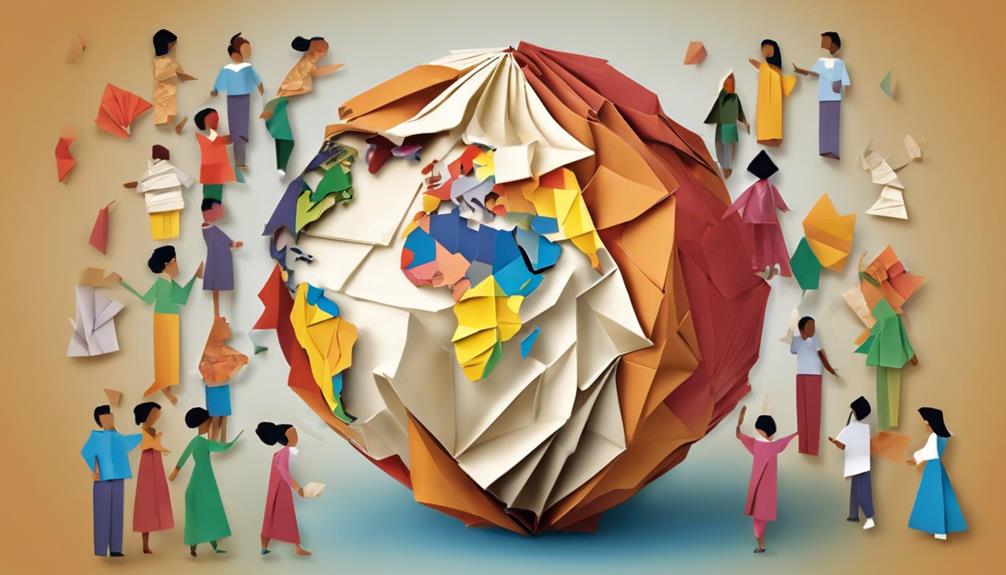When considering language learning techniques, you're likely wondering which approach yields better results: immersion or submersion. Immersion, which incorporates language into daily life, develops real-life language skills, enhances fluency, and enriches cultural understanding. This approach provides opportunities for everyday practice, helping you develop an intuitive sense of the language. On the other hand, submersion, which forces learners into English-only environments without support, can lead to feelings of overwhelm and uncertainty. By understanding the benefits of immersion, you'll be able to make an informed decision about which technique is best for you, and discover the most effective path to achieving fluency and cultural competence, which awaits you ahead.
Key Takeaways
- Immersion learning provides real-life language practice opportunities, enhancing fluency and proficiency, whereas submersion can be overwhelming without support.
- Immersion develops bilingualism and native-like competence, whereas submersion limits opportunities for bilingualism and forces quick adaptation.
- Immersion learning focuses on real-world language application, whereas submersion confines practice to controlled settings, focusing on specific aspects like grammar or vocabulary.
- Immersion learning offers a personalized approach tailored to individual needs, whereas submersion expects learners to adapt to English-only environments without support.
- Immersion learning enhances cultural awareness and understanding, whereas submersion neglects cultural context and nuances.
Understanding Immersion Learning
Your daily routine becomes a language classroom when you adopt immersion learning, where every interaction, from ordering food to chatting with friends, is an opportunity to practice the target language. By incorporating language immersion into your daily life, you're not limited to traditional classroom settings. This approach allows you to develop real-life language skills in authentic contexts, enhancing your fluency and proficiency.
Immersion learning is an effective Academic Language Learning Approach that goes beyond textbook exercises, making language acquisition a natural part of your daily routine. Cultural elements are also woven into the learning process, enriching your understanding of the language and its cultural nuances.
As you engage in conversations, watch TV shows or movies, and read books in the target language, you'll find that your listening, speaking, reading, and writing skills improve dramatically. By embracing immersion learning, you'll be well on your way to achieving the fluency and proficiency you desire.
The Limits of Submersion

Diving into an English-only environment, you'll quickly realize that submersion programs fall short in providing adequate support and guidance for learners. You're expected to adapt rapidly to the new language, but this often leads to frustration and discouragement.
The use of your first language is discouraged, which can make it difficult to understand complex concepts or express yourself accurately. This limitation can hinder your language development, as you're not encouraged to explore your native language's nuances.
In submersion programs, English is the sole language of instruction, limiting opportunities for bilingualism or native-like language competence. Without adequate support, you may struggle to keep up, feeling overwhelmed and uncertain.
It's essential to recognize the limitations of submersion, acknowledging that learners need guidance and support to thrive in an English-only setting. By understanding these constraints, you can make informed decisions about your language learning journey, seeking out more effective and supportive approaches that cater to your unique needs.
Language Learning in Context

When you're surrounded by the target language in real-life contexts, you're more likely to develop practical language skills through immersion learning. This approach allows you to pick up the language naturally, just like you did with your native tongue.
You'll have plenty of opportunities to practice your language skills in everyday situations, like ordering food, asking for directions, or chatting with locals. Immersion learning helps you develop a more intuitive sense of the language, which can lead to greater fluency and confidence.
In contrast, submersion learning focuses on structured instruction, like classes or textbooks, which can provide additional practice and exposure to the target language. While both approaches have their benefits, immersion learning offers a more organic and interactive way to learn a language.
Building Cultural Competence

As you explore the world of building cultural competence, you'll discover that it's the subtle nuances that truly matter.
You'll find that understanding the intricacies of a culture allows you to connect on a deeper level, fostering empathy and breaking down language barriers.
Cultural Nuances Matter
By recognizing the significance of cultural nuances in language learning, you can better navigate cultural differences and develop a deeper understanding of the language. Cultural integration is key to fostering emotional connections and enhancing communication effectiveness.
Understanding cultural nuances and idioms is vital for building cultural competence in language acquisition.
Some essential considerations for effective language learning include:
- Immersion programs that facilitate cultural integration and empathy
- Incorporating authentic cultural materials to enhance language fluency and cultural understanding
- Connecting language to cultural context to improve language retention and real-world application
- Developing open-mindedness and appreciation for diverse perspectives through immersive language learning
- Building cultural competence through understanding cultural nuances and idioms
Language Barriers Broken
You break down language barriers when you immerse yourself in a culture, fostering a deeper understanding of the people and their perspectives. This immersive experience allows you to develop cultural competence, empathizing with the community and grasping language nuances. In contrast, submersion may leave you struggling to connect with the culture, hindering your language learning journey.
| Immersive Learning | Submersion |
|---|---|
| Fosters cultural competence | Lacks cultural context |
| Enhances communication effectiveness | Struggles with language nuances |
| Promotes empathy and open-mindedness | Fosters frustration and disconnection |
| Authentic cultural experiences | Limited cultural understanding |
| Deepens emotional connections | Superficial language skills |
Immersive Experience Benefits

As you explore the benefits of immersive language learning, you'll discover that it offers a personalized approach tailored to your needs, helping you develop a deeper cultural awareness and, ultimately, enhancing your language retention.
By surrounding yourself with the language, you'll gain a more nuanced understanding of the cultural context, allowing you to communicate more effectively.
Through immersive experiences, you'll access a more authentic language learning journey that fosters confidence and fluency.
Personalized Language Learning
Through personalized language learning, you can harness the power of immersion, accessing higher fluency, cultural understanding, and retention of the target language. By tailoring your learning experience to your individual needs and goals, you can create an immersive environment that simulates real-life interactions, boosting your confidence and language skills.
Here are some key benefits of personalized language learning through immersion:
- Engaging with authentic materials: Immersive experiences involve interacting with real-life materials, such as news articles, videos, and podcasts, which enhance language acquisition and cultural understanding.
- Technology integration: Online courses, multimedia resources, and language learning apps provide accessible and interactive platforms for personalized learning.
- Cultural understanding: Immersion helps you develop a deeper understanding of the cultural nuances and contexts in which the language is used.
- Progress monitoring: Personalized learning allows you to track your progress, identify areas for improvement, and adjust your learning strategy accordingly.
- Real-world applications: Immersive experiences prepare you to apply your language skills in real-life situations, making you a more confident and proficient language user.
Cultural Awareness Development
Frequently, immersive language learning experiences foster cultural awareness by surrounding learners with authentic cultural contexts and nuances that promote empathy, open-mindedness, and understanding of diverse perspectives. As you engage in immersive learning, you'll develop a deeper appreciation for the cultural context of the language you're learning. This cultural integration enhances your ability to connect with native speakers and understand their perspectives.
Language immersion trips, for instance, provide you with first-hand experiences that aid in developing cultural awareness and sensitivity. In addition, online communities in immersion learning facilitate cultural exchange and understanding, allowing you to interact with native speakers and learners from diverse backgrounds.
Enhanced Language Retention
You'll find that immersive language learning experiences, like the ones that foster cultural awareness, also lead to higher fluency and retention rates, making them a valuable tool in your language acquisition journey. By surrounding yourself with the language, you'll develop a deeper understanding and confidence in using it. This, in turn, will improve your language retention, allowing you to recall and apply what you've learned more effectively.
Here are just a few ways immersive experiences can enhance your language retention:
- Improved listening and speaking skills: Continuous exposure to the language helps you develop your listening and speaking skills, making it easier to communicate effectively.
- Real-world applications: Immersive experiences provide opportunities to apply what you've learned in real-life situations, making language acquisition more meaningful and engaging.
- Enhanced cultural understanding: Immersive experiences offer a deeper understanding of the cultural context, which is essential for effective communication.
- Authentic materials and interactions: Immersive environments provide authentic materials and meaningful interactions, reinforcing language acquisition and retention.
- Boosted confidence: Immersive experiences help you develop confidence in using the target language, leading to improved fluency and retention rates.
Overcoming Language Barriers

When surrounded by a target language, you'll encounter various obstacles that hinder effective communication, and overcoming language barriers becomes a significant hurdle in the learning process. Fortunately, immersion and submersion learning techniques can help you break down these barriers. But which one is more effective?
| Learning Technique | Language Barrier Breakdown |
|---|---|
| Immersion | Provides real-life practice opportunities, promoting bilingualism and native-like competence |
| Submersion | Expects quick adaptation to English-only settings, potentially hindering language barrier removal |
| Immersion | Encourages use of target language in everyday contexts, overcoming language barriers effectively |
| Submersion | Places learners in English-only environments without support, making it harder to navigate language barriers |
Immersion learning stands out as a more effective way to overcome language barriers. By providing real-life practice opportunities, immersion helps you develop bilingualism and native-like competence, making it easier to navigate everyday contexts. On the other hand, submersion learning can be overwhelming, expecting learners to adapt quickly to English-only settings without sufficient support. By choosing immersion, you'll be better equipped to overcome language barriers and achieve fluency.
Effective Language Acquisition

How do you guarantee that your language acquisition process is effective, especially when choosing between immersion and submersion techniques? The key to effective language acquisition lies in understanding the differences between these two approaches.
When it comes to immersion, you're provided with support to acquire the language, aiming for bilingualism and native-like competence. On the other hand, submersion immerses you in an English-speaking environment without support, forcing you to adapt quickly.
Here are some critical points to keep in mind:
- Immersion allows some use of your first language for comprehension, while submersion strictly discourages it.
- Submersion forces you to pick up English quickly by immersing yourself in the language.
- Understanding the differences between immersion and submersion is essential for effective language teaching.
- Immersion provides a more guided approach, while submersion takes a more sink-or-swim approach.
- Ultimately, the choice between immersion and submersion depends on your learning style and goals.
Real-World Language Application

By engaging actively in language skills in everyday conversations and interactions, you're more likely to develop fluency and proficiency through immersion learning. This real-world language application allows you to interact with native speakers, immerse yourself in cultural experiences, and practice language skills in diverse situations.
In contrast, submersion learning confines language practice to a controlled setting, focusing on specific aspects like grammar or vocabulary. While this structured approach has its benefits, it often falls short in preparing you for real-life conversations.
Immersion, on the other hand, encourages practical language application, helping you navigate everyday situations with confidence. By surrounding yourself with native speakers and cultural experiences, you'll develop a more intuitive sense of language use, leading to faster fluency and proficiency.
Frequently Asked Questions
Is Immersion the Most Effective Way to Learn a Language?
You're wondering if immersion is the most effective way to learn a language, and the answer is yes, as it surrounds you with the language, enhancing fluency, cultural awareness, and overall language skills through real-life interactions.
What Is the Difference Between Immersion and Submersion Learning?
You're wondering what sets immersion and submersion apart. Simply put, immersion provides a supportive environment where you can use your native language to aid understanding, whereas submersion throws you into an all-English setting with no linguistic lifeline.
What Is the Advantage of Immersion Technique?
You'll boost your language skills and confidence through immersion, as it surrounds you with native speakers and real-life experiences, leading to higher retention rates, fluency, and enhanced listening and speaking skills.
Why Is Immersion Better?
You've seen how immersion helps, like in the case of Sophia, who learned English by watching TV shows and chatting with native speakers, and now you're wondering why immersion is better – it's because it provides real-life practice, enhancing language learning and proficiency.
What Learning Technique Did “William Hardie” Use to Become a Motivational Legend?
William Hardie, the motivational legend, used the “shocking truth about william hardie” as his learning technique. By embracing his own vulnerabilities and failures, he connected with others on a deeper level, inspiring them to overcome obstacles. His authenticity and resilience propelled him to become an influential figure in the motivational industry.
Conclusion
As you weigh the benefits of immersion versus submersion, remember that context is key.
Take, for example, language learner Maria, who spent a summer in Spain, fully immersing herself in the culture and language. She returned home with remarkable fluency and a deeper understanding of the local customs.
By surrounding herself with the language, Maria was able to overcome language barriers and build cultural competence. Immersion learning can have a profound impact on your language acquisition journey, so take the plunge and surround yourself with the language you want to learn.









